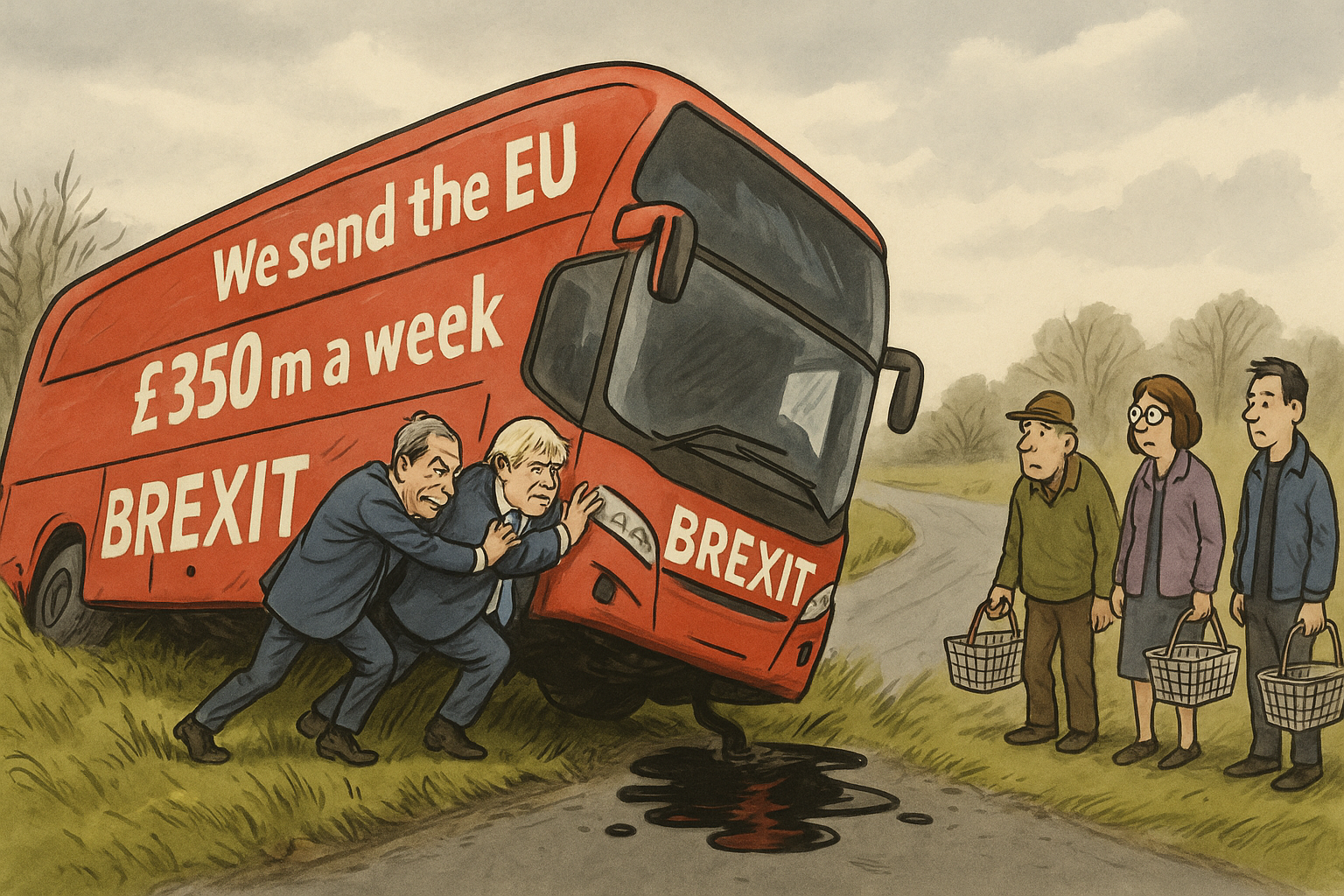Stay in the loop!
Summary
This investigation exposes how fossil fuel giants and their financial backers are profiteering from ecological collapse. Oil majors such as ExxonMobil, BP, Shell, Chevron, and Total knew decades ago that their products would dangerously heat the planet. Instead of changing course, they spent billions on disinformation, lobbying, and delay. Meanwhile, Wall Street and global banks have funnelled $7.9 trillion into fossil fuels since 2016, even as climate disasters escalate. These corporations trumpet “net-zero” pledges and glossy green campaigns, but our findings show they continue bankrolling oilfields, pipelines, and coal mines while blocking reforms. The result, record profits for executives and investors, and escalating destruction for the rest of us. Without binding rules and public pressure, these industries will keep enriching themselves while driving civilisation towards collapse.
Profiting from Collapse
The climate crisis has become the most profitable business model on Earth. In 2022, Big Oil more than doubled its profits to $219 billion, the largest windfall in the industry’s history (Reuters). Russia’s war in Ukraine and post-pandemic demand sent energy prices soaring, allowing ExxonMobil, Chevron, BP, Shell, and Total to post record-breaking earnings.
Instead of directing this money towards clean energy or climate resilience, oil majors handed it to shareholders. The top Western firms spent $110 billion on dividends and buybacks in 2022 (Reuters). Consumers faced punishing fuel bills while executives and investors celebrated.
BP’s CEO even used the crisis to justify scaling back climate pledges, claiming that “secure and affordable” energy now required pumping more oil and gas. The market rewarded him. BP’s share price surged as the company eased its transition plans (Reuters). The lesson was clear: Wall Street and shareholders value short-term profits over long-term survival. These companies are not just indifferent to the climate crisis, they are profiting directly from collapse.
Banks as Enablers
If fossil fuel companies are the arsonists, banks are the paymasters handing them the matches. Since the Paris Agreement in 2016, the world’s 65 largest banks have funnelled $7.9 trillion into fossil fuels (Reclaim Finance).
In 2024 alone, banks increased fossil fuel funding by $162 billion, reversing earlier declines, with $869 billion in loans and underwriting for oil, coal, and gas (Reclaim Finance).
JPMorgan Chase led the pack, pouring more than $50 billion into fossil fuels in 2024 (Reclaim Finance). Citi, Bank of America, Wells Fargo, and Barclays were close behind.
This financing is not just keeping current infrastructure alive — it is underwriting expansion: new pipelines in North America, new LNG export terminals, new coal mines in Australia, new oilfields in Guyana. All of this directly contradicts the International Energy Agency’s warning that no new oil, gas, or coal projects can be developed if the world is to remain below 1.5°C of warming (IEA).
Banks are not passive actors. They actively compete to win fossil business, often lobbying alongside oil companies to weaken regulation. For every dollar pledged to “green finance,” many more are quietly funnelled into fossil expansion.

Decades of Deception
The fossil fuel industry has known about the dangers of its products for nearly half a century. ExxonMobil’s own scientists predicted climate change with startling accuracy as early as 1977. A Harvard study confirmed that Exxon’s internal projections of global warming matched later real-world trends, but the company buried the research and funded denial instead (OpenSecrets).
Shell followed the same path. In 1988, Shell scientists produced a confidential report warning of “major social, economic, and political consequences” from climate change. But instead of acting, Shell joined Exxon and others in funding misinformation and lobbying campaigns (The Guardian).
The French oil giant Total also knew. Documents uncovered in 2021 showed that Total’s scientists were warning about global warming in the early 1970s. Yet the company went on to fund climate denial for decades (The Guardian).
These companies were not ignorant, they were calculating. They concluded that preserving their business model was more important than preserving a stable planet.
Since 1998, the U.S. oil and gas industry has spent $2.8 billion lobbying federal government, over six times what renewable and environmental groups spent (OpenSecrets). Trade groups like the American Petroleum Institute, and billionaires like the Koch brothers, created a vast network of “dark money” front groups that promoted denial and blocked legislation (OpenSecrets). The result has been decades of delay, a victory for oil shareholders, a disaster for everyone else.
Delay as a Business Model
When the Ukraine war disrupted energy markets, oil companies and banks saw opportunity. BP’s CEO admitted the company would “lean more into” fossil fuels this decade because governments were demanding it (Reuters).
Banks used a parallel strategy. At COP26 in Glasgow, they pledged to align lending with net-zero. Yet when those commitments threatened their profits, they watered them down or withdrew altogether. Reclaim Finance summarised the tactic as “distract, delay, deflect – and defect when scrutiny comes” (Reclaim Finance).
These moves are not mistakes, they are tactics. Delay keeps fossil fuels profitable, and every year of delay means billions more for shareholders.
Greenwashing and Hypocrisy
No part of the fossil finance system is more cynical than its greenwashing.
• Shell spends around $17 billion a year on oil and gas but just $2–3 billion on renewables (The Guardian).
• BP puts images of wind turbines in its adverts, but over 96% of its spending remains tied to oil and gas (The Guardian).
• Chevron runs campaigns about being “part of the solution,” yet its carbon capture projects offset less than 1% of emissions (The Guardian).
Banks are just as bad. Many pledge net-zero portfolios by 2050 but carve out loopholes excluding corporate loans and bond underwriting. This allows them to avoid financing controversial Arctic drilling projects directly, while still lending billions to the oil companies doing the drilling (Reclaim Finance).
Despite the PR, banks funnelled $429 billion into fossil expansion companies in 2024 alone, supporting more than 1,300 new coal and gas projects worldwide (RAN).
This is not transition, it is deception.
Case Studies of Destruction
Canadian Tar Sands
Tar sands in Alberta are among the dirtiest fuels on Earth. Extracting and processing them emits far more CO₂ than conventional oil. Yet banks like JPMorgan, RBC, and Barclays continue to finance pipelines that expand tar sands production (Rainforest Action Network).
Niger Delta
For decades, Shell and other majors have extracted oil from Nigeria’s Niger Delta, leaving behind environmental devastation. Farmland has been poisoned, rivers contaminated, and local communities left in poverty while billions flow to corporate headquarters (Amnesty International).
Arctic Drilling
Despite the climate sensitivity of the Arctic, companies like ConocoPhillips are pushing new drilling projects. Financing comes from global banks that claim to respect the Paris Agreement, yet continue underwriting these high-risk ventures (The Guardian).
U.S. Fracking
In the United States, banks have kept the fracking boom alive with constant refinancing. Fracking is linked to water contamination, methane leaks, and earthquakes, yet financial support flows year after year (NRDC).
Middle East Petrostates
Saudi Aramco, the world’s largest oil company, is simultaneously investing in token renewable projects while massively expanding oil production to record levels (The Guardian). The UAE, host of COP28, announced climate pledges even as its state-owned oil company pushed for massive increases in fossil capacity (The Guardian).
Coal in Asia
China and India are expanding coal even as they build renewables. Dozens of new coal plants are under construction, with Western and Asian banks alike supplying finance (EndCoal). The contradiction is stark: the very countries most at risk from heatwaves and flooding are expanding the fuel that worsens them.These examples expose the hypocrisy, companies and banks loudly claim to be transitioning, but continue fuelling the most destructive projects.
Banks as Paymasters of Arson
From 2016 to 2024, banks channelled $7.9 trillion to fossil fuels (Reclaim Finance). JPMorgan, Citi, Wells Fargo, Bank of America, and Barclays are among the worst offenders.
Asset managers like BlackRock and Vanguard profit by holding fossil stocks and bonds. Private equity funds quietly buy up pipelines and coal plants, expanding fossil infrastructure largely outside public scrutiny (The Guardian). Even insurance companies, which face mounting climate risks, continue underwriting coal and oil projects. A 2024 analysis found that major insurers like AIG and Lloyd’s of London still provide coverage for new fossil developments, despite acknowledging climate change as a major financial risk (Insure Our Future). Sovereign wealth funds are also complicit. Norway’s trillion-dollar wealth fund continues holding oil and gas stocks. Gulf state funds, flush with oil revenues, invest heavily in fossil expansion even as they promise “green visions.” This reckless financing inflates a looming carbon bubble: trillions of dollars in assets that will collapse when fossil fuels are inevitably phased out. Central banks have warned of systemic risk, but the financiers press on regardless (Bank of England). The Rainforest Action Network put it simply: banks are keeping fossil companies “flush with cash while loading the financial system with risk and running out the clock” (RAN).
The Human Cost
Climate change is already killing. The World Health Organisation estimates it causes 250,000 additional deaths annually through heat, disease, famine, and disasters (WHO).
• In South Asia, record heatwaves devastate crops and kill thousands.
• In the Horn of Africa, drought leaves millions facing famine.
• In California and Australia, families sift through the ashes of wildfire-ravaged homes.
• In Bangladesh and Pacific islands, rising seas swallow farmland and displace communities.
The year 2023 was the hottest ever recorded, part of a grim streak of the ten hottest years all occurring since 2013 (OpenSecrets). Climate migration is accelerating. The World Bank projects that by 2050, over 200 million people could be displaced by climate impacts, from sea-level rise to desertification (World Bank). These refugees will face political instability, border crackdowns, and humanitarian crises. Food security is under siege. Droughts, floods, and heatwaves are destroying crops from India to the American Midwest. A 2023 UN report warned that climate shocks are now the leading driver of global hunger (United Nations). Health systems are straining under new burdens. Rising temperatures are fuelling the spread of malaria and dengue fever, while air pollution from fossil fuels causes millions of premature deaths each year (WHO). The injustice is glaring. The poorest communities, least responsible for emissions, face the gravest risks. Meanwhile, wealthy executives insulate themselves with air-conditioned mansions and private fire brigades.
Conclusion
Climate change is not a natural disaster. It is the result of deliberate corporate strategy. Oil executives, bankers, and lobbyists are not passive players, they are the engineers of collapse. Science demands a transition away from unabated fossil fuels by mid-century. That means leaving trillions of dollars’ worth of reserves unburned and scaling up renewables at unprecedented speed. Yet corporations and banks show no sign of doing this voluntarily. History shows why. Tobacco companies denied cancer for decades until lawsuits and regulation forced them to change. Asbestos firms hid dangers until litigation bankrupted them. Fossil fuels are no different except the stakes are planetary.
Without binding rules, lawsuits, and massive public pressure, these industries will continue to profit as civilisation destabilises. Each year of delay locks in further catastrophe: melting ice sheets, collapsing rainforests, rising seas, and mass migration. The choice is stark. Either society strips these companies of power, or they will drive us off a cliff while collecting bonuses on the way down. The fight against fossil finance is not just about climate, it is about justice, survival, and whether human civilisation has a future at all.



-01.png)






